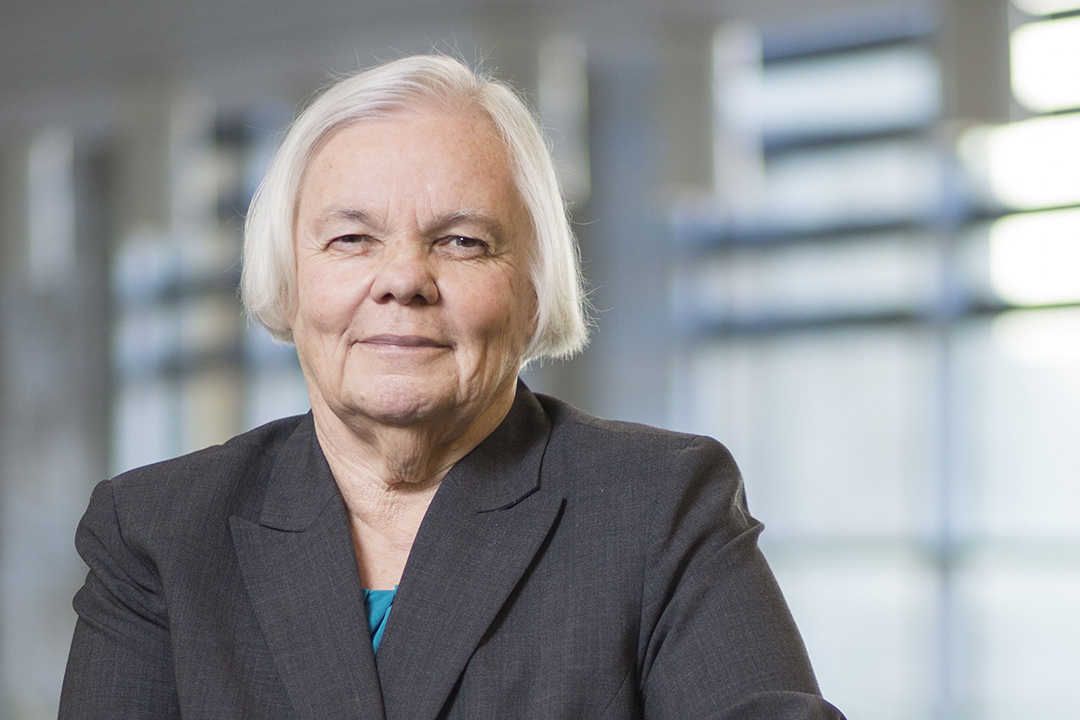
USask has always been home for Bilson
Little did she know that 66 years later she would be a key member of the university’s leadership team, a leading law scholar and the longest-serving active female professor on campus.
By James Shewaga“We first came here in 1952 when I was six when my father became the dean of the College of Commerce, so it has always felt like home here,” said Bilson. “I was around the campus in my childhood and then later as a student and faculty, so it has always been a special place for me.”
July 1 marked a remarkable 40 years as a faculty member in the College of Law for Bilson, who has spent the last two and a half years on secondment serving as University Secretary. Bilson began her time at the university 56 years ago as a young student when she earned the first of three degrees—bachelor’s (1967), master’s (1970) and law (1977), followed by a PhD (1982) at the University of London. Bilson began teaching law at USask in 1979 and 20 years later was named the first female dean of the college, a role she filled three times throughout her illustrious career.
“(USask President) Peter Stoicheff always says the College of Law has had three female deans in its history and they have all been Beth Bilson,” she said with a chuckle.
Bilson’s remarkable resume also includes serving as the first female chair of the Saskatchewan Labour Relations Board, twice serving as the first female acting dean of law, and one of only two individuals to serve as a dean on three separate occasions. A teaching trailblazer dedicated to supporting the advancement of women in academics and the legal profession, Bilson has been a role model and mentor for young female students and staff on and off campus for years.
“I didn’t consciously set out to be a pioneer for women particularly, I just did things that seemed interesting to me,” she said. “As it turned out, I was the first woman in certain roles, and I am quite satisfied about that, and I have had women say that they were impressed by that and that was something that was meaningful to them. I wasn’t setting out to demonstrate that women could do anything in particular, although I was quite confident that they could. But I think in retrospect, it has been an interesting career.”
Indeed. A highly regarded scholar and extensively published expert in administrative and labour law, Bilson has earned a number of honours and distinctions throughout her career, including the YWCA Women of Distinction Award in 2014 and the Canadian Bar Association (CBA) Louis St. Laurent Award of Excellence in 2015.
A pioneer in her profession at a time when there were only three female faculty members in the College of Law when she started, Bilson was admitted to the bar in Saskatchewan in 1984, served as editor of the CBA’s Canadian Bar Review for 10 years, and was awarded the designation of Queen’s Counsel for Saskatchewan in 2000. As dean, she led the creation and implementation of the College of Law’s first strategic plan, while also contributing off campus when she was appointed chair of the federal task force on pay equity in 2000.
During her more than half a century on campus, she has watched the university undergo expansion and transformation, both in its skyline and in its student body.
“There have been a lot of physical changes, but I would say the diversity of the university has been the biggest change, in terms of the students and also the faculty and staff,” she said. “Part of that is the huge increase in the number of Indigenous students and there weren’t very many in my early experience at the university. So, it has been wonderful to see so many more and I think the university has been enriched by the increase in the number of Indigenous students, and also by the number of international students.”
So, what’s next for Bilson? She would like to write about the history of the university, and the College of Law in particular. But Bilson is also currently enjoying her role as University Secretary, in which her wealth of institutional knowledge serves her well working in university governance with executive leadership and the members of the Board of Governors, Senate and Council.
“I think one of the things that I have always enjoyed about university-level activity is the different vantage point on the institution and having an understanding of how the institution as a whole operates and how complicated it is,” said Bilson. “It’s been interesting work and I enjoy it.”
